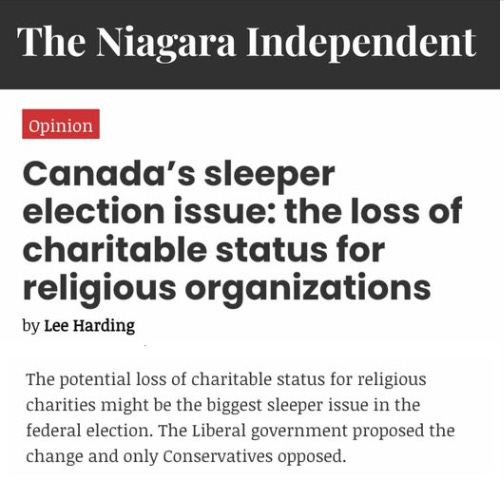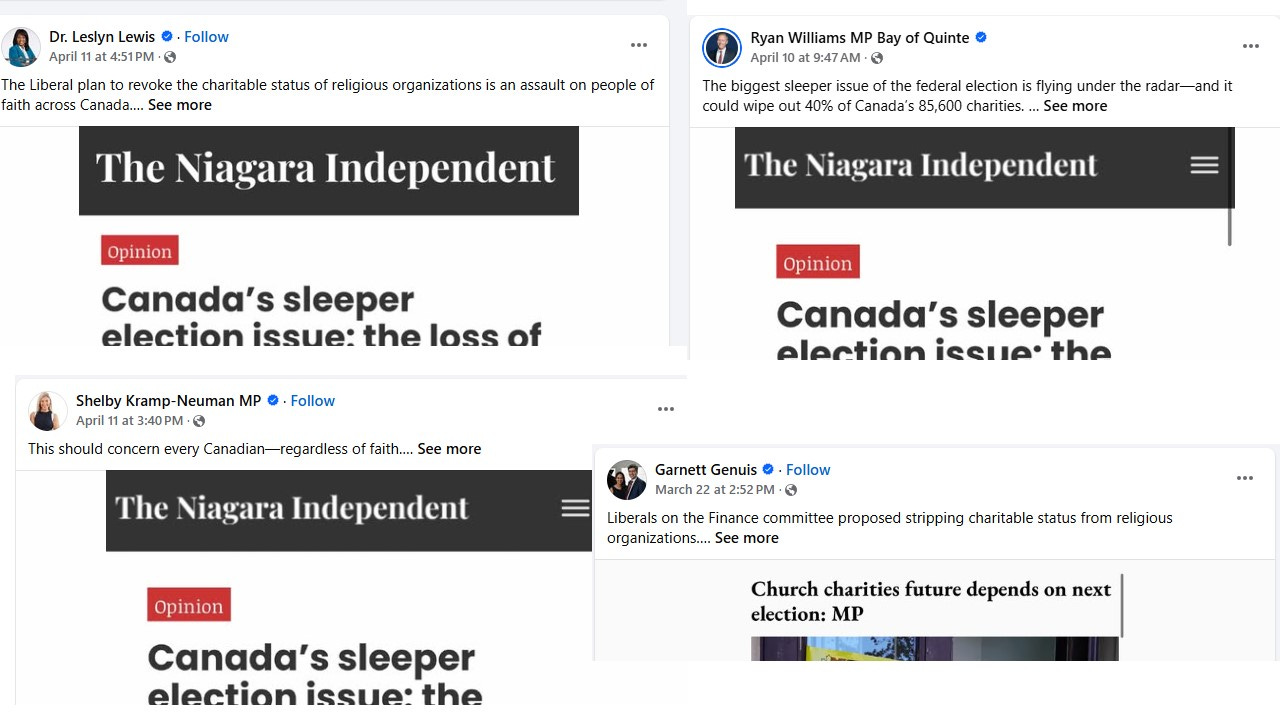The Sleeper Issue
The Conservative Party enjoys evangelical support because it's the only party that even gives them the time of day.
Quite a number of things about Election 2025 have surprised me. One that has not is the hidden and little understood dynamic of evangelical Christians in a Canadian election.
Aha....some may say; you’re talking about Pierre Poilievre’s secret agenda to roll back abortion and LGBTQ rights! No, I’m talking about this post, which is widely circulating on social media among evangelicals and other religious conservatives:
Leaving aside the source (the online Niagara Independent doesn’t say much about itself, and mixes local coverage with a lot of national issues), this is a real thing. In its December pre-budget report, the House of Commons Standing Committee on Finance did indeed make these two recommendations:
Recommendation 429
No longer provide charitable status to anti-abortion organizations.
Recommendation 430
Amend the Income Tax Act to provide a definition of a charity which would remove the privileged status of “advancement of religion” as a charitable purpose.
So while the reference in the post to “the Liberal government” is incorrect - it was a House of Commons committee, presenting its annual wishlist of 462 recommendations to the actual government - it is correct that a proposal was made by a Liberal-led parliamentary committee that could threaten the charitable status of both anti-abortion and all religious organizations. The full report was endorsed by the Liberals, NDP, and Bloc, though the latter two issued their own supplementary opinions, neither addressing these two recommendations; the Conservatives dissented from the entire report, which is common, though their dissent doesn’t mention those items either.
I’ve found nothing in the mainstream press on this, though it’s extensively covered in the religious media and in statements by religious organizations. I also made a rudimentary investigation of how these recommendations came about but came up empty (e.g,, there’s nothing in the report explaining either recommendation, and a search for the word “abortion” in all Finance Committee hearings since 2021 yielded only a single exchange, not related to tax status; nor did a search of the words “charitable” and “religious”/”religion” find anything relevant). Any discussions and decisions were made behind closed doors. The recommendations appear to have been made by the BC Humanist Assocation in its submission to the committee last summer, but that doesn’t explain why the committee apparently copy-pasted them into the report.
What I do know is that THIS is the sort of thing that keeps evangelicals, conservative Catholics, and others firmly in the Conservative camp, despite the party’s repeated refusal to even discuss abortion and its general support for gay and lesbian rights (though noticeably less on trans rights). It’s not even about the policy itself so much as the vagueness behind it. Where did this come from? Are the implications understood? Did the committee know it would set off a five-alarm blaze in religious neighbourhoods?
Religious conservatives are still very mindful of the Canada Jobs issue a few years ago, when federal summer job funding was denied to organizations that were not willing to affirm their support for reproductive rights. Stemming from a kerfuffle over funding that went to organizations specifically focused on anti-abortion activism, the new rules swept up pretty much every evangelical and Catholic organization and other groups that did not support abortion, but were focused on other activities like summer camps or just plain holding church on Sunday.
I don’t want to get into the weeds of that issue, but what remains striking is that the Liberal government did not seem to have thought the matter through; that their attempt to cut off abortion protestors would also entangle ordinary church activities and social services. Their explanations were tepid; more or less saying that they didn’t mean to take on the entire Catholic Church and every religious conservative in the country and that surely there were ways around the new rules.
Now we have a new case - admittedly this time only by a House committee of backbenchers, not the government - of proposals that are even more radioactive as far as religious groups are concerned, since the second recommendation targets them all regardless of their views on abortion. They’ve failed to get any mainstream media traction or explanation. But by golly, they are sure getting discussed within religious circles…with the support of the Conservative party. A quick social media search will find Tories posting the above image or otherwise raising the issue:
But even this is belated and middling support. As mentioned above, the Tories didn’t get up in arms when the report came out. Instead there is a “petition” on the Conservative party website calling on “the Canadian government” to reject the recommendations (it’s undated, but the Internet Wayback Machine shows it was up by December 19, a week after the committee report). A petition? That’s sort of odd for a political party website which, um, usually states actual party policies. So even the Tories aren’t out in front making a big deal of this.
Why? Because they don’t have to. Religious conservatives have so little power in Canadian politics that they are happy if any party gives them the time of day. This is deeply different than the USA, where evangelicals - or at least a weird form of evangelicalism - have taken control of the entire political agenda. They are aggressively moving forward. In Canada, evangelicals are primarily fighting defensive battles, like trying to cling to tax status. And half the battle is just getting noticed, such as these explosive recommendations buried in a committee report that no one else is talking about. (I’m focusing at this point on evangelicals, which is what I know the most about, but the points largely apply to conservative Catholics and other conservative religious groups).
Research (e.g, here) has repeatedly shown that Canadian evangelicals are not as across-the-board conservative as their American counterparts, and many are open to more centrist and even leftist positions on social justice, international development, and the environment. But as I’ve written in various places over the years, the Conservative party enjoys the bulk of evangelical support just by making them feel noticed - even with a vague “petition.” Pierre Poilievre, like his predecessor Stephen Harper, avoids talking about abortion as much as possible, and so there’s no way he wants to be talking about this. Instead the party is letting the word spread through the grassroots to show that, unlike the other parties, it understands this is a big deal, solidifying and deepening the bond without really doing much.
Meanwhile, a social media search will also find some frantic explanations by Liberal candidates that this was only a committee recommendation, not party policy. But the inclusion of this bomb in the report seems another example of Liberal cluelessness about religion, at least elements of it. And the lack of attention outside of religious circles does not help the sense of detachment many evangelicals feel towards the mainstream media and other institutions - not simply that they don’t share their values, but that they don’t understand them at all. The way the Conservatives do, even if doesn’t lead to a whole lot.
Way back in 2011, the Harper Conservatives proposed an Office of Religious Freedom. This was largely covered as an “ethnic issue,” and I realized no one was recognizing this was a giant win for evangelicals. So I wrote an article in the Globe and Mail that for all the worry about a Harper hidden agenda, here was the real thing, and it was in plain sight; it just wasn’t being seen. And here is another example. That’s the real story of evangelicals and Canadian politics.
April 25 update: Globe and Mail tax columnist Tim Cestnick wrote a column yesterday on the issue. He reports reaching out to all committee members but only hearing back from the NDP and Conservatives. No Liberals.
If you enjoy this newsletter, you may like my essays on Canadian politics in the excellent online Australian journal Inside Story.




This isn't really about all religious organizations nor about evangelicals in particular. If that was the intent then the authors of the recommendation don't understand charities and charity law, nor do those so fired up about it.
The specific proposal is to remove charitable status for those charities which “advance religion.” This is primarily churches, synagogues, mosques etc who have buildings for religious worship, religious instruction, pastoral and missionary work. So this would affect the gamut of Catholic, United, evangelical and the variety of Jewish, Muslim and beyond more formal worship related charities.
Many (most?) religious organizations which run food banks, do street work, do international development work, housing, shelter etc, would likely be charities under the other charitable purposes such as relief of poverty, advancement of education, or other purposes beneficial to community. While it is true that some churches/synagogues etc also run these programs, they don’t have to under the church incorporation. It is important to be clear what is at stake to know what to argue about and who to engage. https://www.canada.ca/.../establ.../charitable-purposes.html
The Notwithstanding Clause will be used by Poilievre at the behest of his pro life caucus members. And then by the pro gun gang. And then by the two-sexes crowd. And so on.